人教版九年级英语第十三单元知识点总结
人教版九年级英语unit13知识点归纳
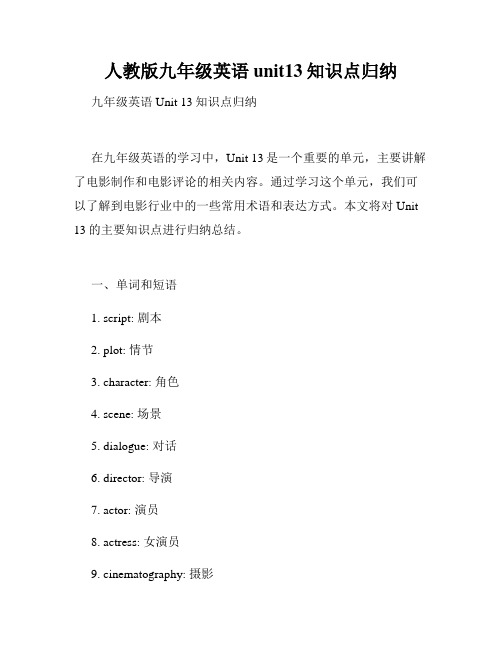
人教版九年级英语unit13知识点归纳九年级英语Unit 13知识点归纳在九年级英语的学习中,Unit 13是一个重要的单元,主要讲解了电影制作和电影评论的相关内容。
通过学习这个单元,我们可以了解到电影行业中的一些常用术语和表达方式。
本文将对Unit 13的主要知识点进行归纳总结。
一、单词和短语1. script: 剧本2. plot: 情节3. character: 角色4. scene: 场景5. dialogue: 对话6. director: 导演7. actor: 演员8. actress: 女演员9. cinematography: 摄影10. special effects: 特效11. soundtrack: 配乐12. box office: 票房13. premiere: 首映式14. sequel: 续集15. genre: 类型二、句型和语法1. 形容词比较级和最高级:例如"The film is more interesting than I expected."和"This is the best movie I've ever seen."2. 定语从句:例如"The actor who played the main character did a great job."3. 被动语态:例如"The film was directed by a famous filmmaker."4. 特殊疑问句:例如"What do you think of the actress in the movie?"5. 宾语从句:例如"He asked me what I thought of the film."三、听力技巧1. 听清语音:要注意区分不同的发音,特别是元音和辅音的区别。
九年级人教版英语unit13知识点

九年级人教版英语unit13知识点Unit 13: Knowledge for 9th GradersAs students progress through their academic journey, they encounter various subjects that challenge their intellect and broaden their horizons. Among these subjects, English serves as a powerful tool for effective communication, cultural appreciation, and personal growth. Let us delve into Unit 13 of the 9th-grade People's Education Press English textbook to explore some key aspects.1. Vocabulary Expansion:Unit 13 introduces students to a plethora of new words and phrases associated with the theme of "Holidays and Celebrations." Understanding and mastering new vocabulary is crucial for comprehending texts in English. Whether it be words like "traditional," "parade," or "costume" or phrases like "come along," "take part in," or "dress up," students must actively practice incorporating them into their written and spoken language.2. Grammar:Grammar forms the backbone of any language. In Unit 13, students dive into the realm of the Present Perfect Tense. This tense is essentialfor expressing actions that have occurred in the past but have a connection to the present. Through examples such as "I have seen this movie before" or "She has already finished her homework," students learn to convey experiences, accomplishments, and unfinished actions in a concise manner.3. Reading Comprehension:Reading comprehension is a crucial skill for students to cultivate. In this unit, students explore various texts related to holidays and celebrations. They learn to identify main ideas, infer meaning from context, and analyze the author's purpose. By practicing comprehension strategies, such as skimming and scanning, students improve their ability to extract information efficiently from written texts.4. Listening Skills:Effective listening skills are invaluable for successful communication. Unit 13 provides ample listening activities that challenge students' ability to understand spoken English from different accents and contexts. By engaging in various tasks, such as listening for specific details or completing gaps in a transcript, students develop their auditory processing skills, sharpen their focus, and enhance their overall listening comprehension.5. Speaking and Presentation:In Unit 13, emphasis is placed on developing students' speaking and presentation skills. Through interactive activities like group discussions, role-plays, and presentations, students gain confidence in expressing their opinions, supporting their arguments, and engaging in meaningful conversations. These exercises help students break free from the fear of making mistakes and foster an environment of active participation and collaboration.6. Writing Skills:Writing is a cornerstone of effective communication. In this unit, students refine their writing skills by crafting compositions centered around holidays and celebrations. They learn to organize their ideas coherently, incorporate appropriate vocabulary and grammar, and craft engaging introductions and conclusions. Through practice and feedback, students gain the necessary skills to express themselves in writing effectively.Unit 13 of the 9th-grade People's Education Press English textbook provides a comprehensive framework for students to acquire language proficiency, critical thinking skills, and cultural awareness. By expanding vocabulary, understanding grammar concepts, developing reading comprehension, honing listening skills, enhancing speaking andpresentation abilities, and refining writing skills, students embark on a journey of linguistic growth and self-expression. With dedication, perseverance, and guidance from their teachers, students can harness the power of Unit 13 to become confident English speakers, writers, and global citizens.。
人教版九年级英语(全一册)Unit13_单元语法知识归纳汇总
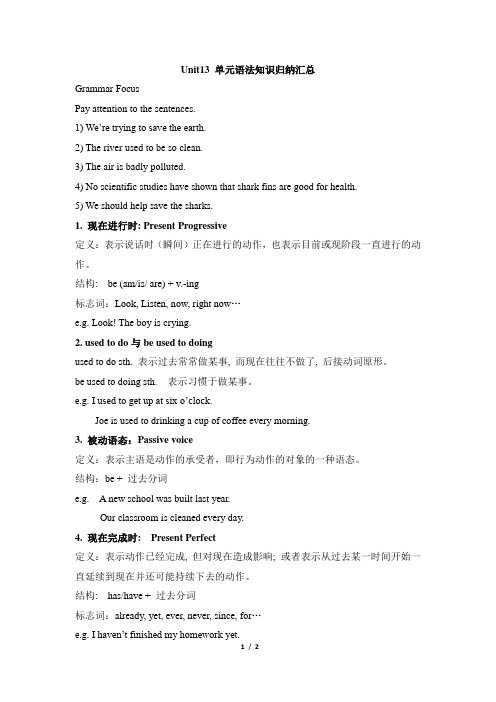
Unit13 单元语法知识归纳汇总Grammar FocusPay attention to the sentences.1) We’re trying to save the earth.2) The river used to be so clean.3) The air is badly polluted.4) No scientific studies have shown that shark fins are good for health.5) We should help save the sharks.1. 现在进行时: Present Progressive定义:表示说话时(瞬间)正在进行的动作,也表示目前或现阶段一直进行的动作。
结构: be (am/is/ are) + v.-ing标志词:Look, Listen, now, right now…e.g. Look! The boy is crying.2. used to do与be used to doingused to do sth. 表示过去常常做某事, 而现在往往不做了, 后接动词原形。
be used to doing sth. 表示习惯于做某事。
e.g. I used to get up at six o’clock.Joe is used to drinking a cup of coffee every morning.3. 被动语态:Passive voice定义:表示主语是动作的承受者,即行为动作的对象的一种语态。
结构:be + 过去分词e.g. A new school was built last year.Our classroom is cleaned every day.4. 现在完成时: Present Perfect定义:表示动作已经完成, 但对现在造成影响; 或者表示从过去某一时间开始一直延续到现在并还可能持续下去的动作。
人教版九年级英语Unit13单词、课文,知识梳理,词汇句式精讲

人教版九年级英语Unit13单词、课文/知识梳理/词汇句式精讲Unit13 单词litter[litə(r)]v. 乱扔n. 垃圾;废弃物bottom[bɔtəm]n.底部;最下部fisherman[fiʃə(r)mən]n. 渔民;钓鱼的人coal[kəul]n. 煤;煤块public[p ʌblik]adj. 公众的;公共的n. 民众;百姓ugly[ ʌgli]adj. 丑陋的;难看的advantage[ ədva:ntidʒ]n. 优点;有利条件cost[kɔst; kɔ:st]v. 花费n. 花费;价钱wooden[wudn]adj. 木制的;木头的plastic[plæstik]adj. 塑料的n. 塑料;塑胶make a difference有关系,作用,影响shark[ ʃa:(r)k]n. 鲨鱼fin[fin]n.(.鱼)鳍cut off割掉;砍掉method[meθəd]n. 方法;措施cruel[kru:əl]adj. 残酷的;残忍的harmful[ha:(r)mfl]adj. 有害的chain[tʃein]n. 链子;链条ecosystem[i:kəusistəm]n.生态系统low[ləu[ a(.数量等)减少的;低的;矮的industry[indəstri]n. 工业;行业law[lɔ:]n. 法律;法规reusable[ri:ju:zəbl]adj.可重复使用的;可再次使用的afford[əfɔ:(r)d]v. 承担得起(后果);买得起transportation[t ænspɔ:(r)teiʃn]n. 运输业;交通运输recycle[ri:saikl]v. 回收利用;再利用napkin[næpkin]n. 餐巾;餐巾纸upside down颠倒;倒转gate[geIt]n. 大门bottle[bɔtl]n. 瓶;瓶子president[prezidənt]n. 负责人;主席;总统inspiration[inspəreiʃn]n. 灵感;鼓舞人心的人(或事物)metal[metl]n. 金属creativity[kri:eitivəti]n. 创造力;独创性WildAid[waildeid]野生救援协会(美国)WWF(World Wide Fund For Nature) 世界自然基金会Mark[ma:(r)k]马克(男名)Jason[dʒeisən]贾森(男名)Ken [ken]肯(男名)Hayes [heiz]海斯(姓)Jessica[dʒesikə]杰茜卡(女名)Unit13 知识梳理【重点短语】1. at the bottom of the river 在河床底部2. be full of the rubbish 充满了垃圾3. throw litter into the river 把垃圾扔入河中4. play a part in cleaning it up 尽一份力把它清理干净5. land pollution 土地污染6. fill the air with black smoke 使空气中充满了黑烟7. cut down air pollution 减少空气污染8. make a difference 产生影响17. take action 采取行动18. turn off 关掉19. pay for 付费20. add up 累加21. use public transportation 使用公共交通22. recycle books and paper 回收书和废纸23. use paper napkins 使用纸巾24. turn off the shower 关掉喷头25. ride in cars 开车出行【重点句型】1.Even the bottom of the river was full of rubbish.即使河底都充满垃圾。
Unit13重点知识人教版九年级英语全册
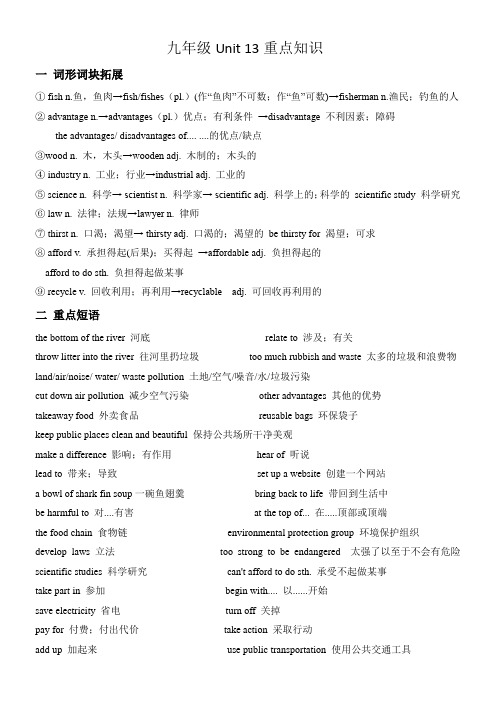
九年级Unit 13重点知识一词形词块拓展① fish n.鱼,鱼肉→fish/fishes(pl.)(作“鱼肉”不可数;作“鱼”可数)→fisherman n.渔民;钓鱼的人② advantage n.→advantages(pl.)优点;有利条件→disadvantage 不利因素;障碍the advantages/ disadvantages of.... ....的优点/缺点③wood n. 木,木头→wooden adj. 木制的;木头的④ industry n. 工业;行业→industrial adj. 工业的⑤ science n. 科学→ scientist n. 科学家→ scientific adj. 科学上的;科学的scientific study 科学研究⑥ law n. 法律;法规→lawyer n. 律师⑦ thirst n. 口渴;渴望→ thirsty adj. 口渴的;渴望的be thirsty for 渴望;可求⑧ afford v. 承担得起(后果);买得起→affor dable adj. 负担得起的afford to do sth. 负担得起做某事⑨ recycle v. 回收利用;再利用→recyclable adj. 可回收再利用的二重点短语the bottom of the river 河底relate to 涉及;有关throw litter into the river 往河里扔垃圾too much rubbish and waste 太多的垃圾和浪费物land/air/noise/ water/ waste pollution 土地/空气/噪音/水/垃圾污染cut down air pollution 减少空气污染other advantages 其他的优势takeaway food 外卖食品reusable bags 环保袋子keep public places clean and beautiful 保持公共场所干净美观make a difference 影响;有作用hear of 听说lead to 带来;导致set up a website 创建一个网站a bowl of shark fin soup一碗鱼翅羹bring back to life 带回到生活中be harmful to 对....有害at the top of... 在.....顶部或顶端the food chain 食物链environmental protection group 环境保护组织develop laws 立法too strong to be endangered 太强了以至于不会有危险scientific studies 科学研究can't afford to do sth. 承受不起做某事take part in 参加begin with.... 以......开始save electricity 省电turn off 关掉pay for 付费;付出代价take action 采取行动add up 加起来use public transportation 使用公共交通工具paper napkins 餐巾纸throw away 扔掉;抛弃put sth. to good use 好好利用某物build....out of....用......建造.....pull.....down 拆下,摧毁upside down 上下颠倒;倒转bring back 恢复;使想起;归还be known for doing sth. 因做某事而闻名play a part in doing sth. 在做某事方面起作用;参与做某事use...to do sth. 用.....做某事三.知识点afford→affords→afforded→afforded1. I ________ afford the new suit, so I decide to buy a similar one in the second-hand market.(盲填)2. Miss Taylor never wastes money on anything too expensive or anything unnecessary, even though she can afford ________(buy)it.四.写作谈论环境问题并提出建议写作任务:某英文报纸上有一个“市长信箱”栏目,假如你是李华,最近你发现你市存在一些环境问题。
人教版九年级英语第十三单元重点、难点、考点及疑点注释

人教版九年级英语第十三单元重点、难点、考点及疑点注释人教版九年级英语第十三单元重点、难点、考点及疑点注释Unit 13 Rainy days make me sad.重点、难点、考点及疑点注释1. I’d rather go to the Blue Lagoon Restaurant... (P102)我宁愿去Blue Lagoon餐厅,……would rather意为“宁愿……”,表示句子主语的愿望、选择,后接省去to的不定式。
He’d rather join you in the English Group. 他宁愿加入到你的英语小组中来。
Which would you rather have, bread or rice? 面包和米饭,你更喜欢哪一个?如果表示“宁愿(可)……也不愿……”则用句型would rather...than...。
在would rather和than后面所连接的两个对比部分一般要一致。
The brave soldier would rather die than give in.那个勇敢的士兵宁死不屈。
He’d rather work than play. 他宁愿工作也不愿玩。
They preferred to die of hunger rather than take his bread.他们宁愿饿死也不愿接受他的面包。
2. Loud music makes me happy. (P103)嘈杂的音乐使我很开心。
Loud music always makes me want to dance. (P103)嘈杂的音乐总是使我想去跳舞。
这两句是动词make的使役用法,make me后分别接了形容词和不定式短语。
make的这种用法常见于以下结构:◎ make+名词(代词)+省略to的动词不定式My parents often make me do some other homework. 我父母常让我做些其他的作业。
完整版人教版九年级英语第十三单元知识点总结
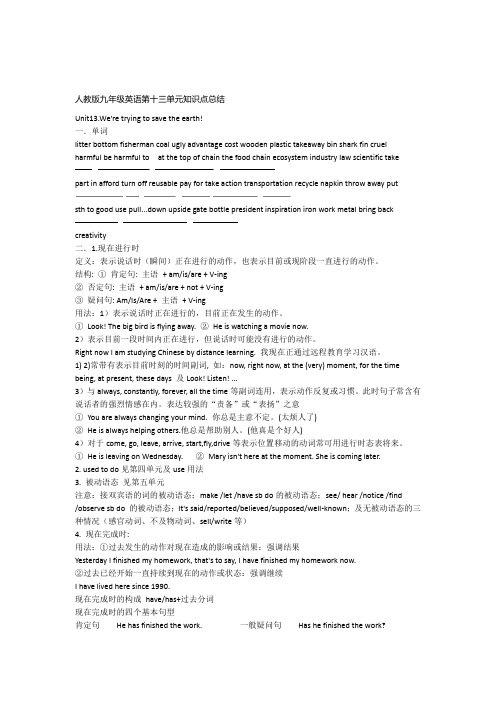
人教版九年级英语第十三单元知识点总结Unit13.We're trying to save the earth!一.单词litter bottom fisherman coal ugly advantage cost wooden plastic takeaway bin shark fin cruel harmful be harmful to at the top of chain the food chain ecosystem industry law scientific takepart in afford turn off reusable pay for take action transportation recycle napkin throw away putsth to good use pull...down upside gate bottle president inspiration iron work metal bring backcreativity二.1.现在进行时定义:表示说话时(瞬间)正在进行的动作,也表示目前或现阶段一直进行的动作。
结构: ①肯定句: 主语+ am/is/are + V-ing②否定句: 主语+ am/is/are + not + V-ing③疑问句: Am/Is/Are + 主语+ V-ing用法:1)表示说话时正在进行的,目前正在发生的动作。
①Look! The big bird is flying away. ②He is watching a movie now.2)表示目前一段时间内正在进行,但说话时可能没有进行的动作。
Right now I am studying Chinese by distance learning. 我现在正通过远程教育学习汉语。
1) 2)常带有表示目前时刻的时间副词, 如:now, right now, at the (very) moment, for the time being, at present, these days 及Look! Listen! ...3)与always, constantly, forever, all the time等副词连用,表示动作反复或习惯。
人教版九年级unit13知识点
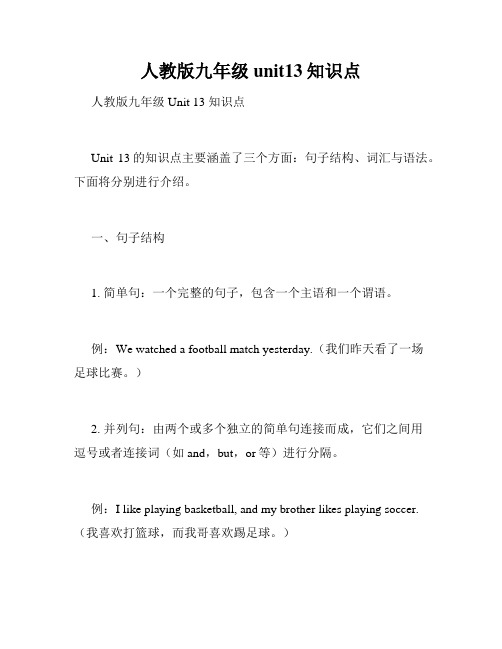
人教版九年级unit13知识点人教版九年级Unit 13 知识点Unit 13的知识点主要涵盖了三个方面:句子结构、词汇与语法。
下面将分别进行介绍。
一、句子结构1. 简单句:一个完整的句子,包含一个主语和一个谓语。
例:We watched a football match yesterday.(我们昨天看了一场足球比赛。
)2. 并列句:由两个或多个独立的简单句连接而成,它们之间用逗号或者连接词(如and,but,or等)进行分隔。
例:I like playing basketball, and my brother likes playing soccer.(我喜欢打篮球,而我哥喜欢踢足球。
)3. 复合句:一个完整的句子,由一个或多个主句和一个或多个从句组成。
例:Although it was raining, we still went hiking.(虽然下雨了,但我们还是去爬山了。
)二、词汇1. 人称代词:第一人称(I,we),第二人称(you),第三人称(he,she,it,they)。
例:He is my best friend.(他是我最好的朋友。
)2. 形容词:用于描述名词或代词的特征或属性。
例:The beautiful flowers are in bloom.(美丽的花儿已经开放了。
)3. 副词:修饰动词、形容词或其他副词,用于表示时间、地点、原因等。
例:She runs very fast.(她跑得非常快。
)4. 动词:表示动作、状态或存在的词。
例:They are swimming in the pool.(他们正在游泳池里游泳。
)三、语法1. 一般现在时:表示经常性或习惯性的动作。
例:I always go to bed early.(我总是早睡。
)2. 一般过去时:表示过去发生的动作或状态。
例:She finished her homework last night.(她昨晚完成了她的作业。
- 1、下载文档前请自行甄别文档内容的完整性,平台不提供额外的编辑、内容补充、找答案等附加服务。
- 2、"仅部分预览"的文档,不可在线预览部分如存在完整性等问题,可反馈申请退款(可完整预览的文档不适用该条件!)。
- 3、如文档侵犯您的权益,请联系客服反馈,我们会尽快为您处理(人工客服工作时间:9:00-18:30)。
人教版九年级英语第十三单元知识点总结Unit13.We’re trying to save the manatees!一.单词litter bottom fisherman coal ugly advantage cost wooden plastic takeaway bin shark fin cruel harmful be harmful to at the top of chain the food chain ecosystem industry law scientific take part in afford turn off reusable pay for take action transportation recycle napkin throw away put sth to good use pull...down upside gate bottle president inspiration iron work metal bring back creativity二.1.现在进行时定义:表示说话时(瞬间)正在进行的动作,也表示目前或现阶段一直进行的动作。
结构: ① 肯定句: 主语+ am/is/are + V-ing① 否定句: 主语+ am/is/are + not + V-ing① 疑问句: Am/Is/Are + 主语+ V-ing用法:1)表示说话时正在进行的,目前正在发生的动作。
① Look! The big bird is flying away. ① He is watching a movie now.2)表示目前一段时间内正在进行,但说话时可能没有进行的动作。
Right now I am studying Chinese by distance learning. 我现在正通过远程教育学习汉语。
1) 2)常带有表示目前时刻的时间副词, 如:now, right now, at the (very) moment, for the time being, at present, these days 及Look! Listen! ...3)与always, constantly, forever, all the time等副词连用,表示动作反复或习惯。
此时句子常含有说话者的强烈情感在内。
表达较强的“责备”或“表扬”之意① You are always changing your mind. 你总是主意不定。
(太烦人了)① He is always helping others.他总是帮助别人。
(他真是个好人)4)对于come, go, leave, arrive, start,fly,drive等表示位置移动的动词常可用进行时态表将来。
① He is leaving on Wednesday. ① Mary isn’t here at the moment. She is coming later.2. used to do见第四单元及use用法3.被动语态见第五单元注意:接双宾语的词的被动语态;make /let /have sb do的被动语态;see/ hear /notice /find /observe sb do 的被动语态;It’s said/reported/believed/supposed/well-known;及无被动语态的三种情况(感官动词、不及物动词、sell/write等)4.现在完成时:用法:①过去发生的动作对现在造成的影响或结果:强调结果Yesterday I finished my homework, that’s to say, I have finished my homework now.①过去已经开始一直持续到现在的动作或状态:强调继续I have lived here since 1990.现在完成时的构成have/has+过去分词现在完成时的四个基本句型肯定句He has finished the work. 一般疑问句Has he finished the work?否定句He has not finished the work. 两回答Yes ,he has. No, he hasn’t.特殊疑问句What has he done?在下列情形下用现在完成时1九词语①already 已经肯定句中或句尾I have already found my pen. = I have found my pen already.①yet已经否定句和疑问句句尾I have not finished the work yet.Have you bought a computer yet?①ever曾经句中Have you ever seen pandas?①never从不句中I have never been to Beijing.①just刚刚句中I have just done my work.①before以前句尾I have never been there before.①so far到目前为止So far he has learned 200 words.①how long多久How long have you lived here?①how many times多少次How many times has he been to Beijing?2两词组have<has>gone to去了某地例:He has gone to Beijing (去了北京,没回) have<has>been to去过某地例:He has been to Beijing. (去过北京,回了)4如果句子里面没有时间状语,汉语意思能够加“已经”,往往用现在完成时态。
Have you lost your library book? 你已经弄丢了从图书馆借的那本书吗?5现在完成时态还常常用于下列句型They have planted many trees in the last/past few years.This is the best book I have ever read.It is the first time I have played the computer games.在现在完成时中,一次性动词不能和一段时间状语连用例:He has bought the book for 3 years.(错)因buy这个一次性动词不能和一段时间for 3 years连用, 改正的办法有:He has bought the book.. (去掉一段时间for 3 years)He bought the book 3 years ago (改为一般过去时,使句子的意思不变) It’s/It has been 3 years since he bought the book. = 3 years has passed since he bought the book. (改为固定句型It is/It has been ---since---)He has had the book for 3 years. (用延续性动词have代替buy)另外①come/arrive/get to/reach → be hereI have come here for 3 years.(错)改为:I have been here for 3 years.①leave/go →be awayHe has left for 3 hours.(错)改为:He has been away for 3 hours.①begin/start →be onThe film has begun for 3 minutes.(错)改为:The film has been on for3 minutes.①open →be open / close → be closedThe shop has opened for 3 years.(错) 改为:The shop has been open for 3 years.①die →be deadHis father has died for 3 years.(错) 改为:His father has been dead for 3 years.①finish/end→ be overHe has finished the work for 3 days.(错) 改为:The work has been over for 3 days①join I have joined the army for 3 years.(错)改为:I have been in the army for 3 years. 或I have been a soldier for 3 years.①buy /catch → haveI have bought the bike for 3 years.(错)改为:I have had the bike for 3 years.He has caught a cold for 3 days.(错)改为:He has had a cold for 3 days.①borrow → keepI have borrowed the book for 3 years. (错)改为:I have kept the book for 3 years.还有其它的归纳如下:break → be broken get up → be up marry → be married become → be lose → be lost5. 情态动词1) 情态动词本身有一定的词义,表示说话人的情绪、态度或语气,但不能单独作谓语,只能与其他动词构成谓语。
常见的有:can (could), may (might), must, need, shall (should), will (would)等。
2) 情态动词无人称和数的变化, 后接动词原形。
否定式是在情态动词后面加not。
个别情态动词有过去式形式, 也可用来表达更加客气、委婉的语气。
1.can和could的用法(1)can/could 表示“能力;许可;可能性”等。
could 为can 的过去式。
如:Can I use your bike?(2)can 用在疑问句中,表示征求意见、请求许可,答语仍用can; could 用在疑问句中,比can 更委婉、客气,是一种礼貌的说法,并不表示过去时态,答语用can,而不能用could。
